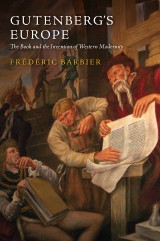Details

Gutenberg's Europe
The Book and the Invention of Western Modernity1. Aufl.
|
19,99 € |
|
| Verlag: | Wiley |
| Format: | |
| Veröffentl.: | 23.05.2017 |
| ISBN/EAN: | 9781509509911 |
| Sprache: | englisch |
| Anzahl Seiten: | 320 |
DRM-geschütztes eBook, Sie benötigen z.B. Adobe Digital Editions und eine Adobe ID zum Lesen.
Beschreibungen
<p>Major transformations in society are always accompanied by parallel transformations in systems of social communication – what we call the media. In this book, historian Frédéric Barbier provides an important new economic, political and social analysis of the first great 'media revolution' in the West: Gutenberg�s invention of the printing press in the mid fifteenth century. In great detail and with a wealth of historical evidence, Barbier charts the developments in manuscript culture in the twelfth and thirteenth centuries, and shows how the steadily increasing need for written documents initiated the processes of change which culminated with Gutenberg. The fifteenth century is presented as the 'age of start-ups' when investment and research into technologies that were new at the time, including the printing press, flourished.<br /><br /> Tracing the developments through the sixteenth century, Barbier analyses the principal features of this first media revolution: the growth of technology, the organization of the modern literary sector, the development of surveillance and censorship and the invention of the process of 'mediatization'. He offers a rich variety of examples from cities all over Europe, as well as looking at the evolution of print media in China and Korea. <br /><br /> This insightful re-interpretation of the Gutenberg revolution also looks beyond the specific historical context to draw connections between the advent of print in the Rhine Valley (�paper valley�) and our own modern digital revolution. It will be of great interest to students and scholars of early modern history, of literature and the media, and will appeal to anyone interested in what remains one of the greatest cultural revolutions of all time. </p>
<ul style="white-space: normal; text-transform: none; word-spacing: 0px; color: #000000; text-align: left; font: 11px Verdana, Geneva, Arial, Helvetica, sans-serif; widows: 1; letter-spacing: normal; text-indent: 0px; -webkit-text-stroke-width: 0px;"> <li>Contents</li> <li>Foreword</li> <li>Introduction</li> <li>Part one Gutenberg before Gutenberg</li> <li>Chapter 1 The preconditions for a new economy of the media</li> <li>The key space of modernity: the town</li> <li>The market in education</li> <li>The emergence of the political</li> <li>Chapter 2 The economy of the book</li> <li>Manuscript production</li> <li>Change: the objects and practices</li> <li>Chapter 3 The birth of the market</li> <li>The market and its regulation</li> <li>The religious paradigm, or the emergence of the masses</li> <li>Writing: work and the professions</li> <li>Part 2 The age of start-ups</li> <li>Chapter 4 The development and logics of innovation</li> <li>Paper and papermaking</li> <li>Xylography</li> <li>Punches, forms and moulds</li> <li>Chapter 5 Gutenberg and the invention of printing</li> <li>Historical portrait of a city</li> <li>Strasbourg</li> <li>The return to Mainz</li> <li>Chapter 6 Innovation</li> <li>Techniques: innovation in processes</li> <li>Practices</li> <li>The society of the workshops</li> <li>The invention of the graphosphere</li> <li>Part three The first media revolution</li> <li>Chapter 7 Printing conquers the world</li> <li>The spread of the innovation</li> <li>Ranking the cities</li> <li>Conjunctures and specializations: the market and innovation</li> <li>Chapter 8 The nature of text</li> <li>The book system</li> <li>The meaning of the text</li> <li>The 'book-machine'</li> <li>Chapter 9 The media explosion</li> <li>A new paradigm: production and reproduction</li> <li>The Reformation and printing</li> <li>Regulation: imposing order on books</li> <li>Printing and governments</li> <li>Conclusion</li> <li>Chronologies</li> <li>Semiology and virtuality</li> <li>Gutenberg?s Europe</li> <li>Notes</li> <li>Abbreviations</li> <li>Index</li> </ul>
"Combining meticulous scholarship with persuasive comparisons between the print and the digital revolutions, Frederic Barbier has made the most important contribution to the field since Elizabeth Eisenstein?s <i>The Printing Press as an Agent of Change."</i><br /><b> Peter Burke, Cambridge University<br /><br /></b> "The great strength of this book is that it roots Gutenberg?s invention so firmly in the mediaeval craft society from which it emerged. Gutenberg was able to draw on a range of pre-existing techniques and developing markets; without these transformations, so meticulously explored here, the print revolution might have been still-born."<br /><b> Andrew Pettegree, St. Andrews University
<b>Frederic Barbier</b> is Director of Research at the Centre national de la recherche scientifique (CNRS) and Director of Studies at the Ecole pratique des hautes etudes, Paris.


















